Mother’s Day 2025: Maureen’s Transformation in Her Own Words
Introduction
This Mother’s Day, we honor the fierce and tender love of mothers like Maureen. Below, Maureen shares what life was like before her community gained access to safe water — and the transformation that clean water made possible for her children, her family, and her dreams.
Before we protected the spring in her Western Kenya community, Maureen never had the time or health to do the things she would have liked. Now, she’s a farmer, brickmaker, businesswoman, and mother of two newly healthy (and adorable) children.
Background
Can you introduce yourself and tell us about your family or your role in the community?
“My name is Maureen Ambulwa from [the] Tumaini community. I am married, a mother of two children. My husband and I do practice small-scale farming [on] our small piece of family land. I am also privileged to serve as the treasurer of the Water User Committee for Ndombi Spring.”
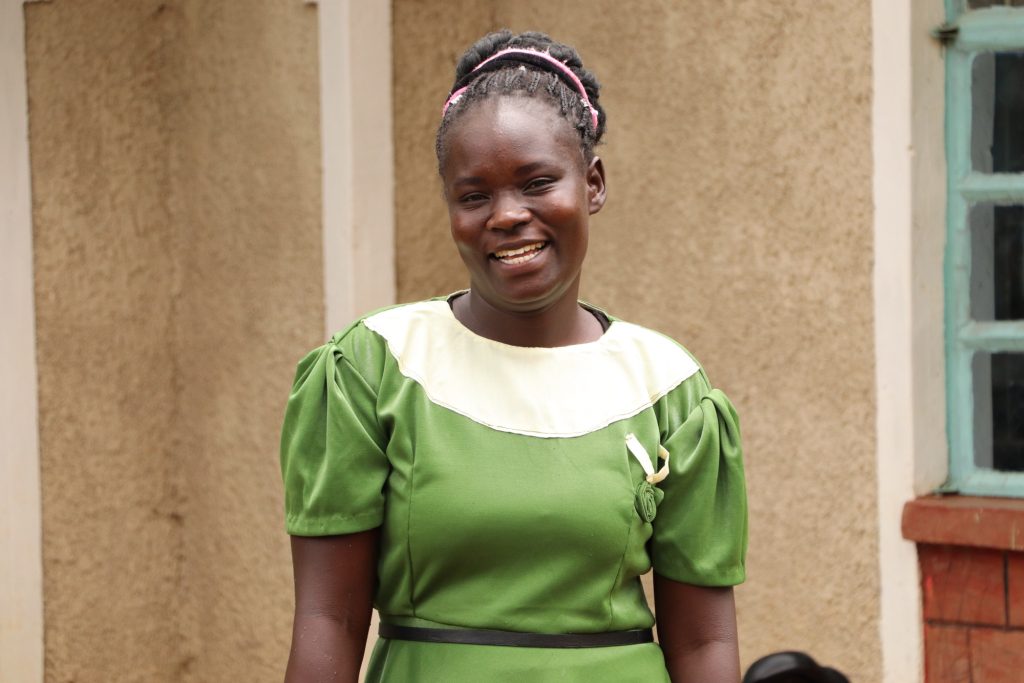
What was your life like before your community had clean water?
“Before 2019, fetching water from the spring was a daily struggle that tested both patience and resilience — especially for women and mothers like me.
“Our water source was nothing more than an open hole in the ground, exposed to the elements and every form of contamination imaginable. When it rained, soil and debris would wash right into it, turning the water murky with filth. Leaves, insects, and sometimes even animal and human waste found their way into the stagnant pool.
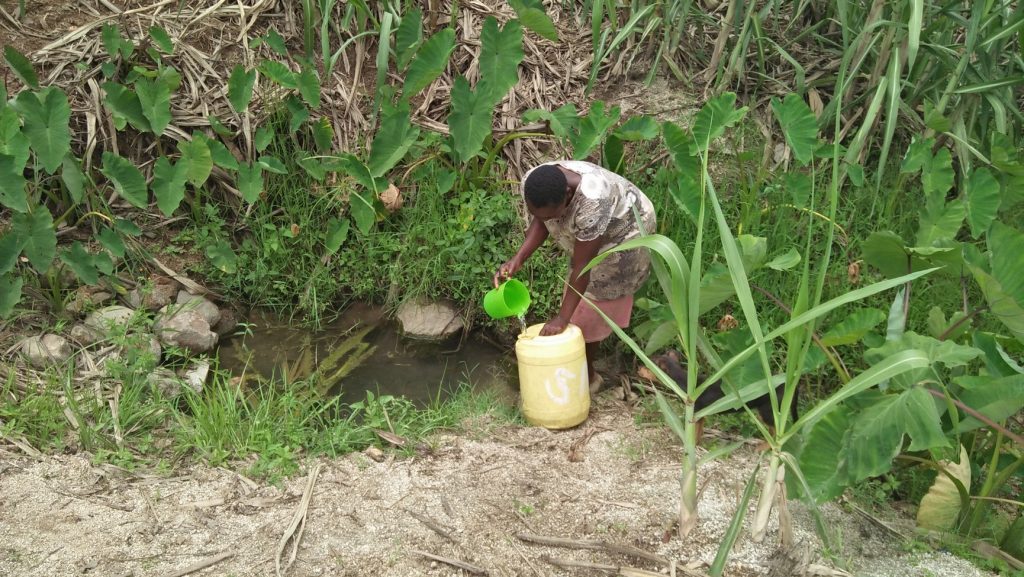
“It was a place that many passed by with a grimace. If you told someone you had drunk water from there, they would look at you in disbelief, maybe even with a bit of pity. It did not just look dirty — it was dirty. Yet, for families like mine, it was the only option.
“Fetching water was my biggest hustle of the day because it was a slow and messy process. Women would meet at the water point early for water, but spent the better part of the morning to get [it].
“We would lower our jerrycans into the pool, trying to scoop carefully without stirring up the sediment. But no matter how gentle the effort, the water would cloud up instantly. One person’s turn meant the next had to wait, sometimes long minutes, for the water to settle again before they could try their luck. It was an act of endurance — standing there in the heat or mud, kids tugging at your kitenge (African attire), waiting for a chance at water that was barely clean enough for washing, let alone drinking.”
Transformation
What’s the biggest change you’ve experienced in your life since water arrived?
“The biggest change? It has to be the health of my children and the peace that has come with it.
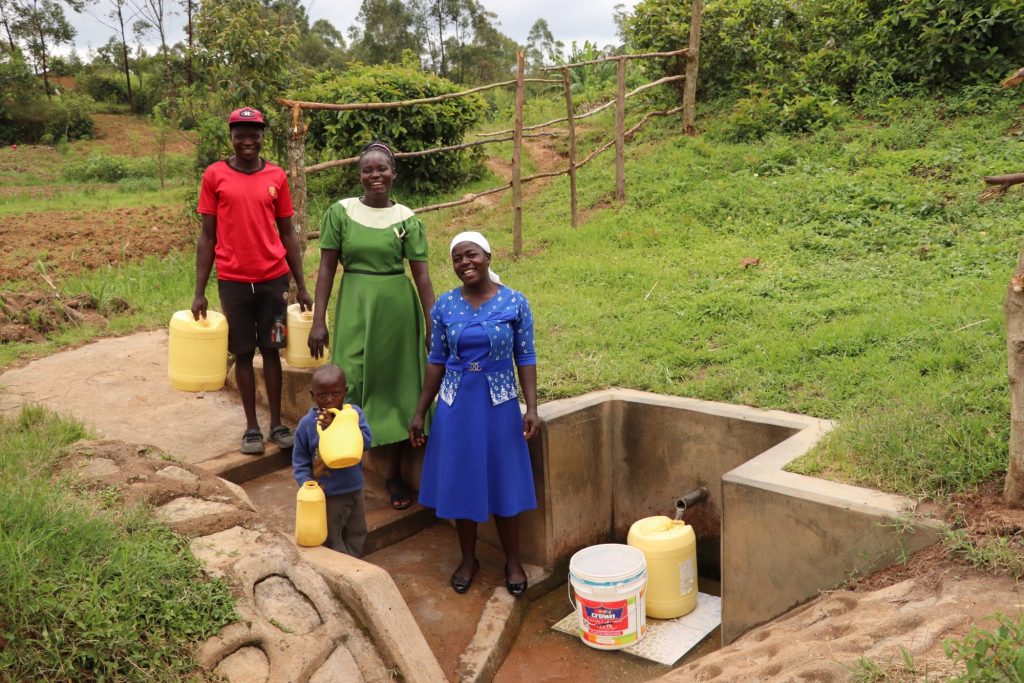
“Before the spring was protected, life was incredibly hard. My children, and those of my co-wives in the homestead, were constantly falling sick with diarrhoea, typhoid, stomach infections, you name it. All of it traced back to that filthy water we depended on.
“I was the one mostly responsible for taking the children to the healthcare facilities. At every visit, the nurses would scold me like I did not care enough. ‘Why don’t you boil the water for these children?’ they would ask.
“And it wasn’t that I didn’t try. I did, but the fact that the water was unsafe created more room for one to contract these ailments more easily.
“I used to boil water every evening or add liquid chlorine when I could afford it, and pour it into a clay pot in the house. I told the children to only drink from here! But how could I monitor every cup they took when they were thirsty, when they were playing, or even at school? It was impossible to control, and the sickness just kept coming.
“We spent so much time and money at the hospital, and this was draining everything we had. And every time I walked into that clinic, I braced myself for the judgment, the cold looks, the harsh words from the nurses.
“Right now, the water is good and safe. I have saved a lot of money that I have used to fence my farm and reinvest in it. I recently tilled it and planted some maize and beans and vegetables, which I sell in the market.
“Protecting this water really worked magic. I can confidently say that I have not gone to the hospital for any water-related illness in a very long time. The children have grown and are healthy, and every time I see them, I smile, not wanting to forget old memories.”
How has clean water helped you reach a personal goal or dream?
“Clean water has changed my life by helping me reach goals that I once thought were far off my reach.
“My husband and I are both farmers, but initially I did not get time to help him in the farm because fetching water consumed much of my time. However, since the protection of the spring, I have had much time saved. We work together in our farm and we have seen real progress in our work.

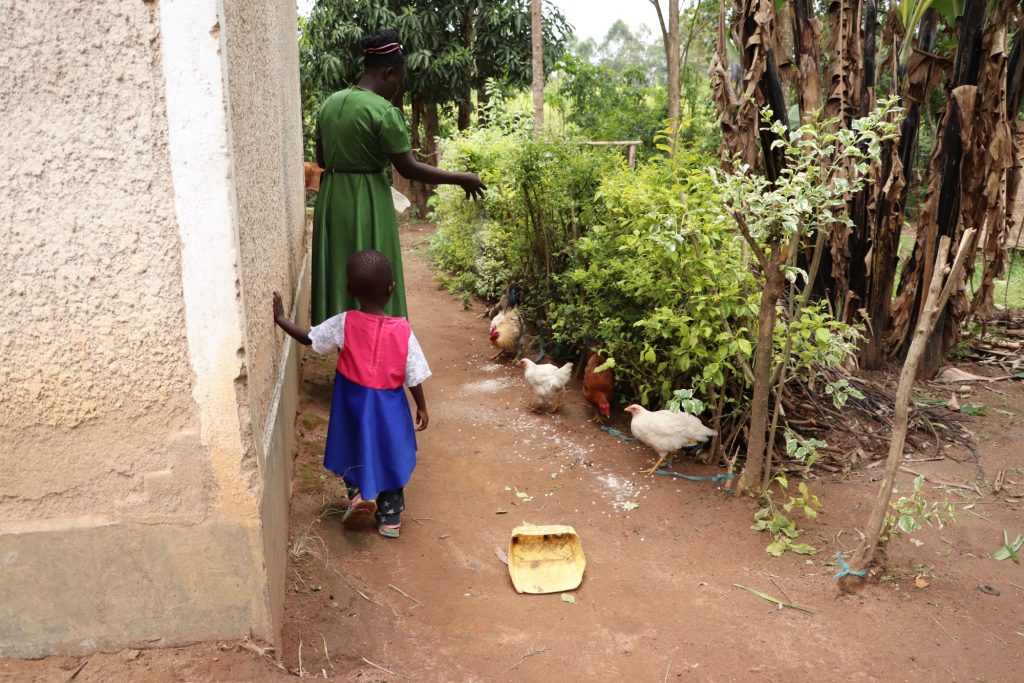
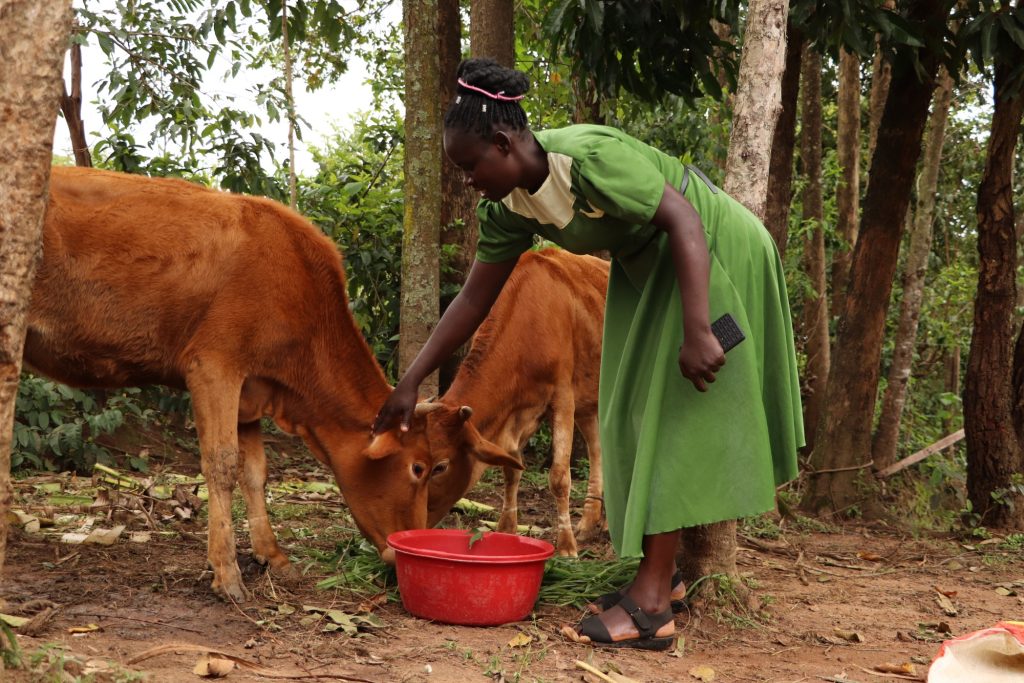
“We are now able to care for our crops and livestock more consistently. As a result, our milk production is better now and we are selling more at the market, thus getting us a steady income, something we could not count on before.
“But beyond the farm, clean water has touched my life in deeper, more personal ways. A few years ago, we lived in a small house, and our compound (yard) was open — no fence, nothing really to call our own. But now we have a bigger house with a fence around it, and better space for our livestock.
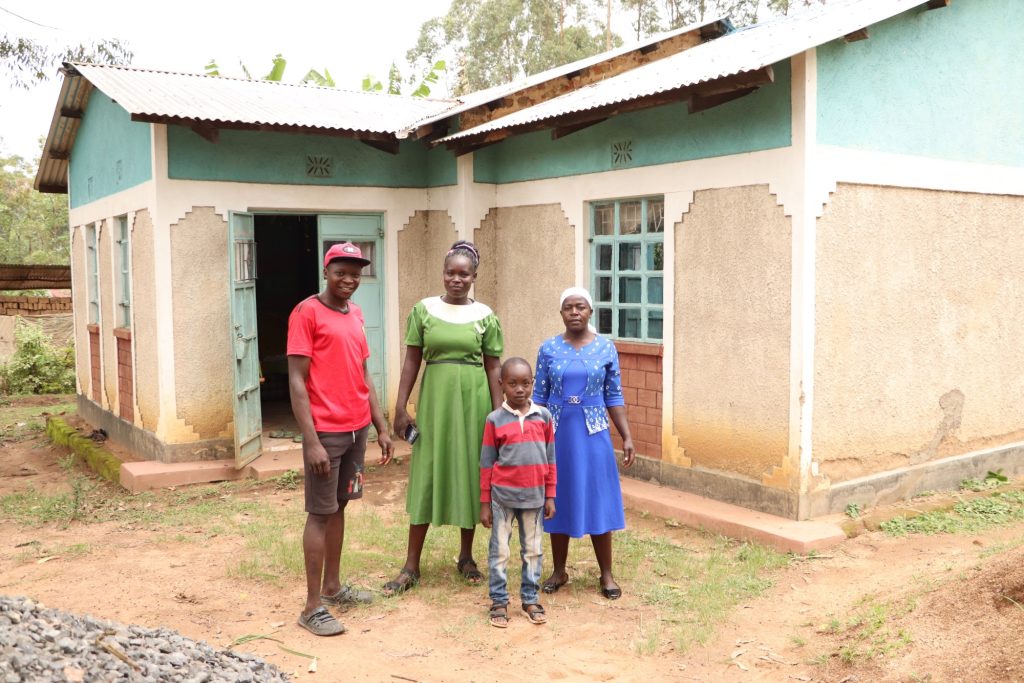
“My kitchen garden is thriving well. I don’t remember the last time I bought vegetables from the market — maybe just fruits — but even those are few, because I have bananas and guavas right here at home.”
What are you able to do now that you never could have imagined before?
“I have my own business.
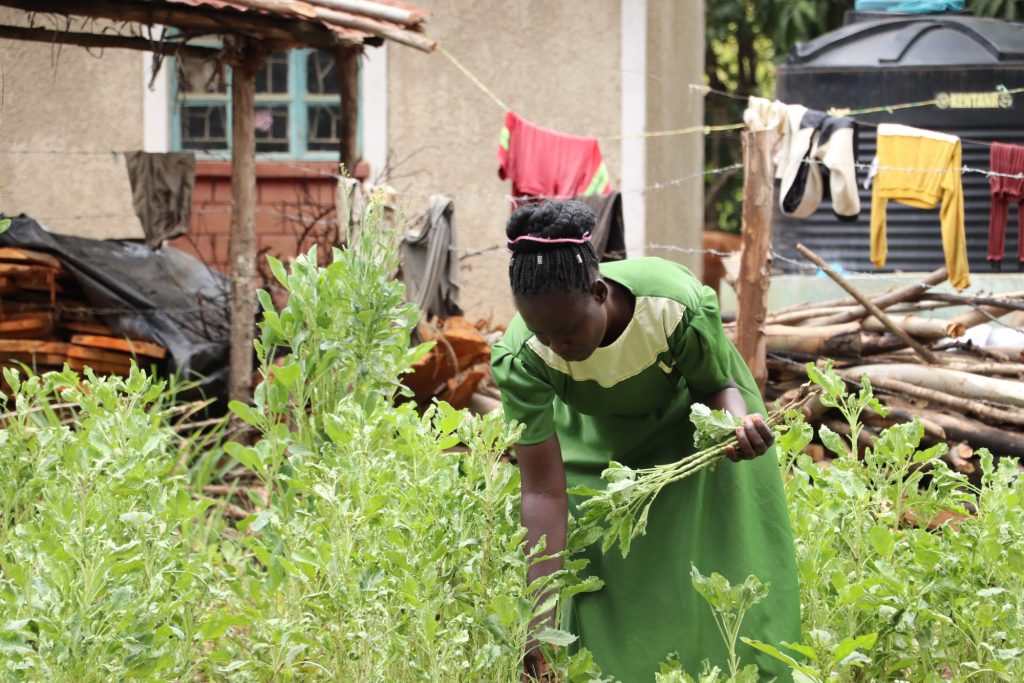
“Back then, I was a stay-at-home wife and could not do a lot, as I always had to take care of someone sick, or myself, or be out cleaning. Right now, after taking care of the few house chores in the morning, I can organize some small vegetables and take them to the market and make some money that I can reinvest in my family. Sometimes, even my neighbors come to purchase vegetables in the evenings.”
Have you seen a change in your children’s or neighbours’ lives, too?
“Yes. My children have become healthier. Just like I said, we hardly visit the hospitals anymore. Our biggest challenge was water, and that was solved a few years back, and now we tackle other issues that are not water-related.

“Even when Madam Betty Muhongo (the project’s Field Officer) visits us sometimes, she always asks how we are doing and if there is any trouble. We talk to her and she guides us. She has really held our hands.
“In the community, and my neighbors, they have also become better people. When the spring was made, they at first did not think too much about it, but after realizing that they fell ill less often, they take care of the spring with a lot of passion as they found out it was the [thing] that kept them from hospitals. When you visit the spring even after a week, you will find that someone has cleaned it recently, or someone is cleaning it.”
Bragging Rights
What are you most proud of today?
“I am proud of the life I have built with the help of my husband, and with the support we received when clean water came to our village.
“I look around my home now and see growth. I see my children healthy and strong. I see my kitchen garden full of vegetables that I planted. I see a compound that is fenced, animals that are well cared for, and a bigger, better house than I never imagined I would live in.
“I am proud of the fact that I no longer sit at home feeling stuck. I run a small business now and I can contribute to my family income. That gives me confidence. It gives me joy. But above all, I am proud that I have been able to care for my family better. That my children drink safe water and don’t fall sick like before and that my husband can focus on his work without constantly worrying about hospital bills. That we now live with peace and dignity, for me, that is everything.”
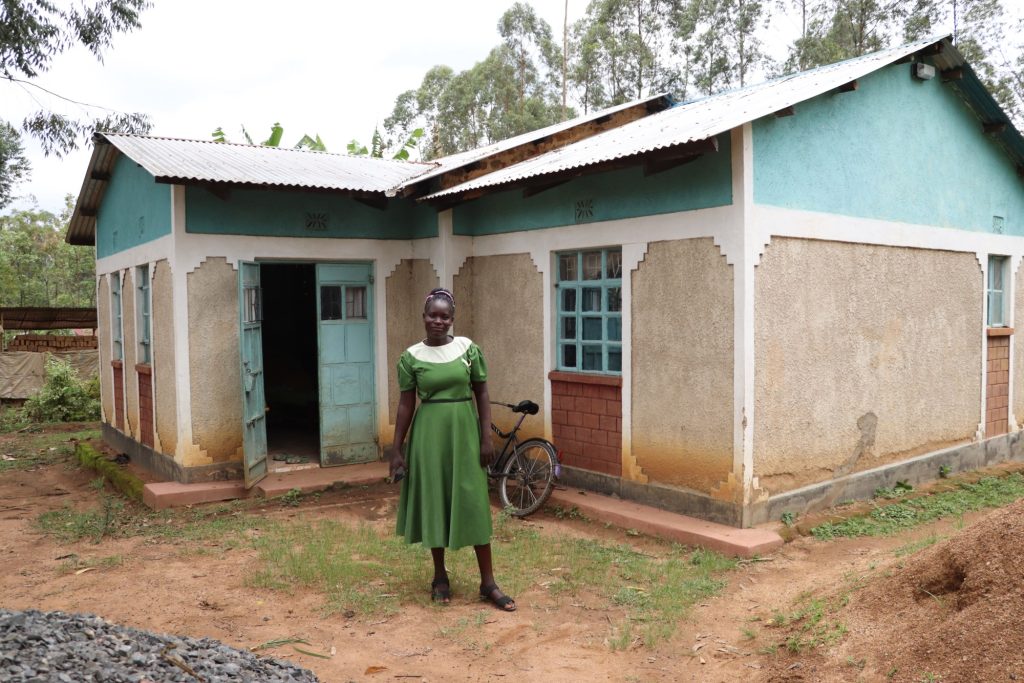
What do you want the people who made this possible to know about how far you’ve come?
“We are healthier, stronger, and with renewed energy to farm, to raise our families, and even to run businesses. Personally, I have grown, become more confident, more hopeful, and more independent. My home is better, my children are thriving, and I feel proud of the life we are building.
“Thank you — from my heart. You did not just give us clean water, but too, it is peace of mind, freed time, and a chance to dream again, and to move forward. You gave us life. Let it be known that your support has made a real, lasting difference in our community.”
If you could say one thing to the people who donated to make this happen, what would it be?
“Thank you for changing our lives. Your donation gave hope, dignity, and a fresh start. May you be blessed for the kindness you showed to people that you have never even met. We are grateful, and we will never forget what you have done for us.”
Conclusion
Maureen’s story shows how safe water can become a foundation for healthier, stronger, and more hopeful lives — for mothers, families, and entire communities.
This Mother’s Day, you can honor the strength of the mother in your life — or the person who raised you — by giving the gift of safe water.
Donate now and make a life-changing difference for another mother like Maureen.
Home More Like ThisTweet